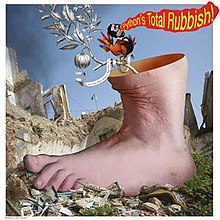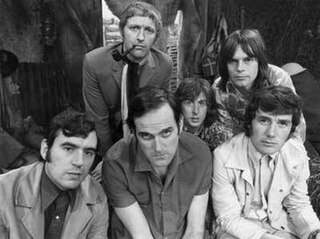
Monty Python were a British comedy troupe formed in 1969 consisting of Graham Chapman, John Cleese, Terry Gilliam, Eric Idle, Terry Jones, and Michael Palin. The group came to prominence for the sketch comedy series Monty Python's Flying Circus, which aired on the BBC from 1969 to 1974. Their work then developed into a larger collection that included live shows, films, albums, books, and musicals; their influence on comedy has been compared to the Beatles' influence on music. Their sketch show has been called "an important moment in the evolution of television comedy".

Monty Python and the Holy Grail is a 1975 British comedy film satirizing the Arthurian legend, written and performed by the Monty Python comedy group and directed by Gilliam and Jones in their feature directorial debuts. It was conceived during the hiatus between the third and fourth series of their BBC Television series Monty Python's Flying Circus.
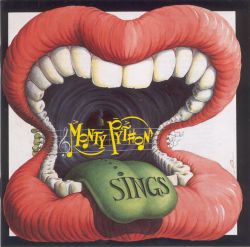
Monty Python Sings is a compilation album of songs by English comedy troupe Monty Python. Released in 1989 to celebrate their 20th anniversary, it contains popular songs from their previous albums and films. The album was dedicated to the memory of founding member Graham Chapman, who died two months before its release.
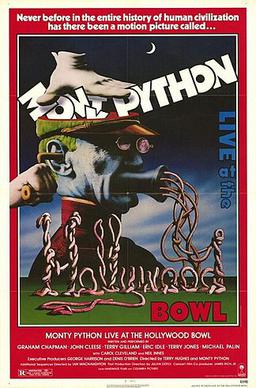
Monty Python Live at the Hollywood Bowl is a 1982 concert comedy film directed by Terry Hughes and starring the Monty Python comedy troupe as they perform many of their sketches at the Hollywood Bowl. The film also features Carol Cleveland in numerous supporting roles and Neil Innes performing songs. Also present for the shows and participating as an 'extra' was Python superfan Kim "Howard" Johnson.

The Monty Python Matching Tie and Handkerchief is the fourth album by the comedy group Monty Python, released in 1973. Most of the material was newly written for the album along with a handful of sketches from the third series of Flying Circus, one from the second ("Bruces") and another from the first. The team were once again joined by Neil Innes, who provided a trio of rock music parodies for "The Background to History". The album was famously mixed and edited in a garden shed belonging to the father of producer Andre Jacquemin.
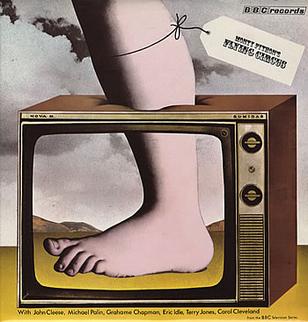
Monty Python's Flying Circus is the first album produced by the Monty Python troupe, released in both the UK and US in 1970, with the US version featuring a back cover slightly different from the original UK version. It features newly recorded versions of sketches from the first Monty Python's Flying Circus television series.
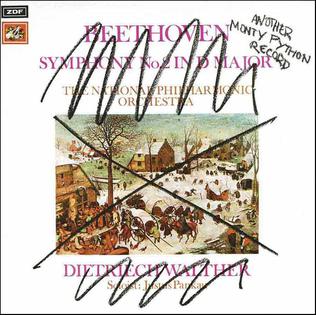
Another Monty Python Record is the second album produced by the Monty Python comedy group, released in 1971. Dissatisfied with their monaural BBC debut album released the previous year, the group took full control of the follow-up, which would be the first release of a six-album deal with Charisma Records in the UK. Most of the material is from the second BBC series of Monty Python's Flying Circus, with a few newly written pieces. One track, "Stake Your Claim", is an English-language version of a sketch from the team's first German episode.

Monty Python's Previous Record is the third album by Monty Python. Released in 1972, it marked the group's first collaborations with regular sound engineer Andre Jacquemin as well as musician Neil Innes, who had previously appeared with future members of the Python team on Do Not Adjust Your Set. The album contains many sketches from the third series of Flying Circus, one from the second as well as an abridged version of "The Tale of Happy Valley" from the second German show. The album was released midway through the broadcast of Series 3, whose sketches featured on the album were all from its first half, with the exception of "Dennis Moore" which aired a month later and therefore made its debut here. The oldest sketch on the album, Eric Idle's "Radio Quiz Game", dates back to I'm Sorry, I'll Read That Again, where it was performed by Graeme Garden – Idle having subsequently performed the sketch himself on two editions of Do Not Adjust Your Set. The rest of the material was specially written for the album.
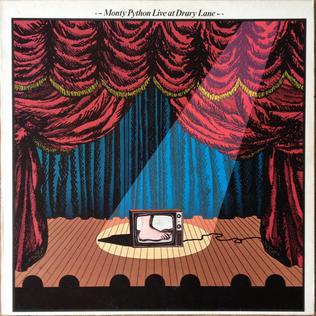
Monty Python Live at Drury Lane is a live album released by Monty Python in 1974. It was recorded on the final night of their four-week run at the Drury Lane Theatre in London earlier that year and edited onto disc with new studio linking material by Eric Idle and Michael Palin. The majority of the sketches are from Flying Circus and vary slightly from their television counterparts, although "Cocktail Bar" was written for the third series but not used. The team also revived sketches from At Last The 1948 Show, including "Secret Service", "Wrestling" and "Four Yorkshiremen" - the latter on its way to being adopted as a Python standard. Neil Innes provided the musical interludes, while Eric Idle's then wife Lyn Ashley replaced regular Python actress Carol Cleveland in supporting roles.

Monty Python Live at City Center is a US-only live album by Monty Python, recorded at the New York City Center in April 1976 and rush released by Arista Records the following month. In order to get the album out in the shops quickly, the recordings were made early on in the run, where some of the performances were affected by faulty microphones. The team were joined onstage by regular actress Carol Cleveland and musician Neil Innes, who also performed in some sketches.
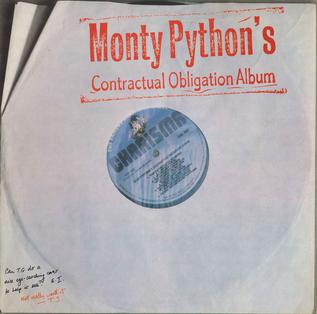
Monty Python's Contractual Obligation Album is the final studio album by Monty Python, released in 1980. As the title suggests, the album was put together to complete a contract with Charisma Records. Besides newly written songs and sketches, the sessions saw re-recordings of material that dated back to the 1960s pre-Python shows I'm Sorry, I'll Read That Again, The Frost Report, At Last The 1948 Show and How To Irritate People. One track, "Bells", dates from the sessions for Monty Python's Previous Record, while further material was adapted from Eric Idle's post-Python series Rutland Weekend Television. The group also reworked material written but discarded from early drafts of Life Of Brian, as well as the initial scripts for what would eventually become The Meaning Of Life.

Monty Python's Personal Best is a miniseries of six one-hour specials, each showcasing the contributions of a particular Monty Python member. Produced by Python (Monty) Pictures Ltd., the series first aired on PBS stations between 22 February and 8 March 2006, although the Eric Idle and Michael Palin episodes were initially released by A&E on two Region 1 DVDs in 2005; the remaining episodes were released in late February 2006.

Python Night was an evening of Monty Python-related programmes broadcast on BBC2 on 9 October 1999, to celebrate the 30th anniversary of the first broadcast of Monty Python's Flying Circus. It featured newly written sketches, three documentaries and a screening of Monty Python's Life of Brian.

Monty Python Live at Aspen was a reunion show featuring the surviving members of the Monty Python team: John Cleese, Terry Gilliam, Eric Idle, Terry Jones and Michael Palin, appearing on stage together for the first time since their Hollywood Bowl shows in 1980. Filmed on 7 March 1998 at the Wheeler Opera House in Colorado as part of The US Comedy Arts Festival, it featured the five Pythons in an interview with host Robert Klein. The late Graham Chapman was also allegedly in attendance as his "ashes" were brought out in an urn with his portrait attached to the front, only to be knocked over by Terry Gilliam.
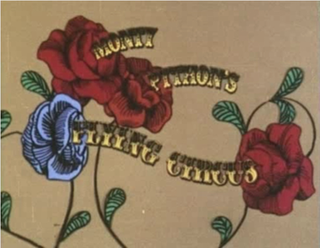
Monty Python's Flying Circus is a British surreal sketch comedy series created by and starring Graham Chapman, John Cleese, Eric Idle, Terry Jones, Michael Palin, and Terry Gilliam, who became known collectively as "Monty Python", or the "Pythons". The first episode was recorded at the BBC on 7 September 1969 and premiered on 5 October on BBC1, with 45 episodes airing over four series from 1969 to 1974, plus two episodes for German TV. A feature film adaptation of several sketches, And Now for Something Completely Different, was released in 1971.
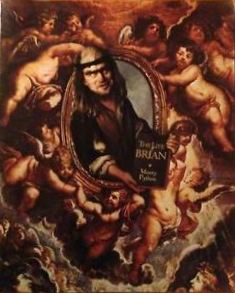
Monty Python's The Life of Brian/MONTYPYTHONSCRAPBOOK is a large format book by Monty Python, released in 1979 to tie in with their film Monty Python's Life of Brian. As the title suggests, it consists of two separate books joined together. The first contains the film's screenplay, illustrated by black and white stills. On the reverse side is the scrapbook, which contains a variety of material such as scenes cut from the film, newly written material plus unrelated items, including the lyrics to Bruces' Philosophers Song. The book was assembled by Eric Idle, with assistance from Michael Palin.

The Fairly Incomplete & Rather Badly Illustrated Monty Python Song Book is a compendium of songs by Monty Python, released in 1994 on the occasion of their 25th anniversary. The book contains the lyrics and musical scores for songs from the group's Flying Circus TV series, albums and films. Also included are "The Ferret Song" and "Rhubarb Tart Song", which originate from I'm Sorry, I'll Read That Again before appearing on At Last The 1948 Show. The musical scores were edited by regular Python collaborator, John Du Prez.

The Pythons Autobiography by The Pythons is the official autobiography of the Monty Python team, released in 2003. It covers the whole of Python history, from their childhoods all the way through to the 30th anniversary celebrations in 1999.
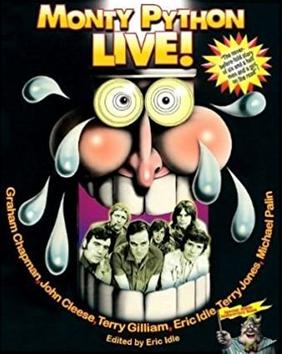
Monty Python Live! is a book detailing the various live performances of the Monty Python team between 1971 and 1980.
